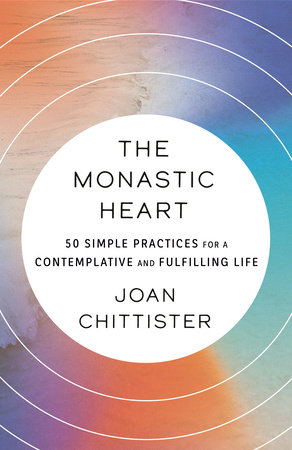The Monastic Heart
50 Simple Practices for a Contemplative and Fulfilling Life
Joan Chittister
Paperback
October 25, 2022 | ISBN 9780593239421
AmazonBarnes & NobleBooks A MillionBookshop.orgHudson BooksellersPowell'sTargetWalmart
Ebook
September 21, 2021 | ISBN 9780593239414
AmazonApple BooksBarnes & NobleBooks A MillionGoogle Play StoreKobo
About the Book
The activist, nun, and esteemed spiritual voice who has twice appeared on Oprah Winfrey’s Super Soul Sunday sounds the call to create a monastery within ourselves—to cultivate wisdom and resilience so that we may join God in the work of renewal, restoration, and justice right where we are.
“Essential reading for anyone wishing to find the compass of their heart and the wellspring from which to live fully.”—Gregory Boyle, founder of Homeboy Industries and New York Times bestselling author of Tattoos on the Heart
“In every beating heart is a silent undercurrent that calls each of us to a place unknown, to the vision of a wiser life, to become what I feel I must be—but cannot name.” So begins Sister Joan Chittister’s words on monasticism, offering a way of living and seeing life that brings deep human satisfaction. Amid the astounding disruptions of normalcy that have unfolded in our world, Sister Joan calls all of us to cultivate the spiritual seeker within, however that may look across our diverse journeys: “We can depend only on the depth of the spiritual well in us. The well is the only thing that can save us from the fear of our own frailty.”
This book carries the weight and wisdom of the monastic spiritual tradition into the twenty-first century. Sister Joan leans into Saint Benedict, who, as a young man in the sixth century, sought moral integrity in the face of an empire not by conquering or overpowering the empire but by simply living an ordinary life extraordinarily well. This same monastic mindset can help us grow in wisdom, equanimity, and strength of soul as we seek restoration and renewal both at home and in the world.
At a time when people around the world are bearing witness to human frailty—and, simultaneously, the endurance of the human spirit—The Monastic Heart invites readers of all walks to welcome this end of certainty and embrace a new beginning of our faith. Without stepping foot in a monastery, we can become, like those before us, a deeper, freer self, a richer soul—and, as a result, a true monastic, so “that in all things God may be glorified.”
“Essential reading for anyone wishing to find the compass of their heart and the wellspring from which to live fully.”—Gregory Boyle, founder of Homeboy Industries and New York Times bestselling author of Tattoos on the Heart
“In every beating heart is a silent undercurrent that calls each of us to a place unknown, to the vision of a wiser life, to become what I feel I must be—but cannot name.” So begins Sister Joan Chittister’s words on monasticism, offering a way of living and seeing life that brings deep human satisfaction. Amid the astounding disruptions of normalcy that have unfolded in our world, Sister Joan calls all of us to cultivate the spiritual seeker within, however that may look across our diverse journeys: “We can depend only on the depth of the spiritual well in us. The well is the only thing that can save us from the fear of our own frailty.”
This book carries the weight and wisdom of the monastic spiritual tradition into the twenty-first century. Sister Joan leans into Saint Benedict, who, as a young man in the sixth century, sought moral integrity in the face of an empire not by conquering or overpowering the empire but by simply living an ordinary life extraordinarily well. This same monastic mindset can help us grow in wisdom, equanimity, and strength of soul as we seek restoration and renewal both at home and in the world.
At a time when people around the world are bearing witness to human frailty—and, simultaneously, the endurance of the human spirit—The Monastic Heart invites readers of all walks to welcome this end of certainty and embrace a new beginning of our faith. Without stepping foot in a monastery, we can become, like those before us, a deeper, freer self, a richer soul—and, as a result, a true monastic, so “that in all things God may be glorified.”
Read more
Close




